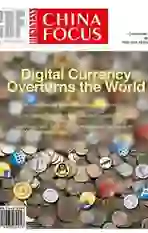Professors Clash Over Proper Role of Government in Economy
2017-01-10
Chinese economists have long struggled with the ideological gap that separates free-market advocates and supporters of government controls on market forces.
That struggle was evident Wednesday (Nov 9) during a debate between two prominent Peking University economists firmly entrenched on opposite sides of the debate.
Professor Justin Yifu Lin, a Chinese government adviser and former chief economist at the World Bank, supports the industrial policies common in China — including subsidies, tax breaks and financial incentives— aimed at supporting specific industries considered crucial for the nations economic growth.
"I havent seen a country thats achieved economic growth without an industrial policy," Lin said during the debate, sponsored by the universitys National School of Development.
His opponent, professor Zhang Weiying, a free-market advocate, begged to differ. "Industrial policy is just a planned economy in disguise," he said. "In the end, both will fail for the same reasons."
The Chinese governments top economic planner, the National Development and Reform Commission, backs Lins stance. Commission spokesman Zhao Chenxin said in September that industrial policy plays an essential role in Chinas development, but that policies should be updated to fit modern market trends.
While admitting some governments have applied industrial policies in controversial ways, Lin called government controls "rational" and the basis for economic success in many countries, including Japan and South Korea.
Zhang, however, credited the free market — not politically motivated government subsidies — with gamechanging innovations that benefit society. He cited as examples James Watt and the steam engine, George Stephensons intercity railway, and Jack Mas innovative online marketplaces under Alibaba.
Chinas ongoing transition to a market-based economy — including its overtaking Japan to become the worlds second-largest economy— has relied on labor-, capital- and resource-intensive industries. But the transitions negative side effects have included structural imbalances and excess capacity in certain sectors. Moreover, some state-owned enterprises such as telecoms have been challenged by disruptive innovators, such as social networks.
Zhang said industrial policy can foster greed. For example, companies may collude with government officials to win special favors. And policymakers can make mistakes, given that even the most well-informed intellectual cannot always predict market trends.
In any country, Zhang said, "a free market and entrepreneurs can make the best of comparative advantages." Lin, however, believes a combination of market forces and active government involvement is needed to foster industrial progress. Japans steel, oil and auto industries contributed to double-digit growth in the gross domestic product in the 1960s thanks to government policies, he said.
But Zhang said Japans auto industry would never have taken off if not for the fact that Honda Motor Co. Ltd. founder Soichiro Honda opposed a 1961 industrial policy barring his company, which then made motorcycles, from building cars. And industrial policies have done nothing to help Japans 20 most successful industries, said Zhang, citing a study by Harvard University professor Michael Porter.
Lin admitted some industrial policies have triggered economist objections because they were improperly applied. "Some nations support an industry that has already lost its edge only because it stabilizes the labor market," Lin said, referring to the European Unions dairy-sector subsidies.
Wednesdays debate marked the latest phase in an ongoing discussion between Lin and Zhang who, despite their opposing views, are colleagues and friends.
The two clashed last summer when Lin, in a speech, argued in favor of industrial policy. Zhang took the opposite position at a forum a few days later. Theyve also exchanged views in publications over the years.
The latest event was their first face-to-face clash in public on industrial policy. The academic community has been closely following the LinZhang debate. And some economists have taken sides.
Zhuo Yongliang, a guest researcher at the China Society of Economic Reform, disagrees with Lin. He said market forces and government controls, which Lin thinks should work together, cannot get along.
Wu Jinglian, a government adviser, thinks the days of industrial policy have passed. Wu favors boosting economic growth through a "policy of competition" that encourages fair play and blocks monopolies.
杂志排行
中国经贸聚焦·英文版的其它文章
- China Eyes Yuan Outflows in Battle Against Sinking Currency
- Planned Technological Transformation of Agri cultural Sector Fails to Im press Farmers
- Digital Currency Overturns the World
- Latest Public Official Changes in China
- Exhibitions
- Li Xiaohong Former President of Wuhan University Appointed as Deputy Minister of education
